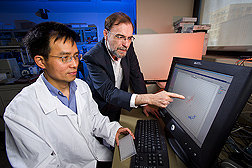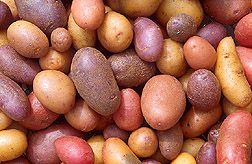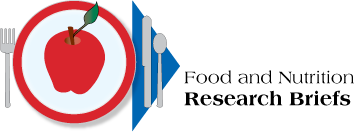This page has been archived and is being provided for reference purposes only. The page is no longer being updated, and therefore, links on the page may be invalid.
March 2019
FNRB Index | Search | Comments
Contents
International Research Team Finds Correlation Between Genetics and Obesity Is Modified by Diet
Innovative Approach to Breeding Could Mean Higher Yields and Better Crops
ARS Molecular Biologist Receives National Academy of Sciences Prize in Food and Agriculture Sciences
USDA Scientist Receives the Borlaug Field Award
Update on the 2020 Dietary Guidelines

Molecular biologist Chao Qiang Lai (left) and geneticist Jose Ordovas use a DNA sequence system to identify which individuals carry a specific mutation associated with high triglycerides or obesity.
International Research Team Finds Correlation Between Genetics and Obesity Is Modified by Diet
A first-of-its-kind study making an in-depth examination of a gene-diet interaction has identified an epigenetic mark—a genetic feature not directly governed by the genetic code—that is associated with saturated fat intake. The researchers also looked at biochemical, physiological and genetic processes that are involved in this common gene-diet interaction. They found individuals with the genetic variant APOA2 consume more food and have a higher Body Mass Index. They also found persons who carried the APOA2 variant who took in a high-saturated fat diet had a stronger epigenetic mark near APOA2. An epigenetic mark can be thought of as a type of natural chemical decoration on the genome that regulates gene activity. Obesity is not simply a result of food intake alone. It is a product of genetic and environmental factors acting together. The results of this study could explain why individuals with this genetic factor consume more food and have a higher BMI.
Scientific contact: José M. Ordovás, (617) 556-3102, Jean Mayer USDA Human Nutrition Research Center on Aging at Tufts University, Boston, Massachusetts.

A technology developed by ARS scientists is being used to boost resistance to a disease in potatoes that can destroy entire fields and often requires growers to repeatedly spray fungicides.
Innovative Approach to Breeding Could Mean Higher Yields and Better Crops
Agricultural Research Service (ARS) scientists have found a way to streamline the process that scientists use to insert multiple genes into a crop plant, developing a reliable method that will make it easier to breed a variety of crops with vastly improved traits. The technology is expected to speed up the process for developing new varieties of potatoes, rice, citrus and other crops that are better equipped to tolerate heat and drought, produce higher yields and resist a myriad of diseases and pests. Crops with greater resistance to pathogens and insects could greatly reduce pesticide use and prevent billions of dollars in crop losses. The GAANTRY gene stacking technology will be freely available to anyone interested, and a commercial firm is planning to use it to introduce multiple genes into potatoes to make them more resistant to late blight, which is caused by a fungus-like organism. Late blight can destroy entire fields and force some farmers to spray fungicides up to 15 times a year. The researchers’ unique platform stabilizes large “stacks” of DNA needed for conferring key traits, allowing researchers to insert suites of genes “so precisely that no unintended DNA is added or lost during the process."
Scientific contact: Roger Thilmony, (510) 559-5761, Crop Improvement and Genetics Research Unit, Western Regional Research Center, Albany, California.

ARS molecular biologist Elizabeth Ainsworth
ARS Molecular Biologist Receives National Academy of Sciences Prize in Food and Agriculture Sciences
Agricultural Research Service (ARS) molecular biologist, Elizabeth Ainsworth, has been honored with the National Academy of Science’s Prize in Food and Agriculture Sciences. She was recognized for her groundbreaking research to show how crops such as corn and soybeans are affected by increases in atmospheric carbon dioxide and ozone, especially in combination with drought and other environmental stresses, along with potential solutions. Exposure to ozone pollution over the past 30 years has reduced corn yields by about 10 percent and soybean yields by about 5 percent. Research to help protect the future of crop production in corn and soybeans in the face of global climate change is important to the United States, and the world. This facility focuses on providing solutions to the question of how to feed the world in the face of global climate change. SoyFACE involves testing plants in open-air field conditions under atmospheric conditions predicted for the year 2050 and beyond. This facility focuses on providing solutions to the question of how to feed the world in the face of global climate change. SoyFACE involves testing plants in open-air field conditions under atmospheric conditions predicted for the year 2050 and beyond.
Scientific contact: Elizabeth Ainsworth, (217) 265-9887, Global Change and Photosynthesis Research Unit, Urbana, Illinois.

Matthew Rouse
USDA Scientist Receives the Borlaug Field Award
The World Food Prize Foundation announced that ARS plant pathologist Matthew Rouse is the winner of the 2018 Norman Borlaug Award for Field Research and Application. Rouse was honored for his research in global wheat improvement and protection against wheat diseases. He has played a significant role in global efforts to contain and reduce the impact of Ug99, a devastating wheat disease that threatens the world’s wheat crops. As coordinator of the ARS spring wheat nursery project in Kenya and Ethiopia, Rouse identified U.S. wheat breeding lines with resistance to Ug99. Some of these resistant lines have been released and include a successful University of Minnesota variety “Linkert.”
Scientific contact: Matthew Rouse, (612) 625-7781, Cereal Disease Laboratory, St. Paul, Minnesota.
Update on the 2020 Dietary Guidelines
Twenty nationally recognized experts have been appointed to serve on the 2020 Dietary Guidelines Advisory Committee by the U.S. Departments of Agriculture (USDA) and Health and Human Services (HHS). The independent advisory committee will review scientific evidence on various topics and questions identified by the Departments and will provide a report on their findings to the Secretaries. Their review, along with public and agency comments, will help inform USDA and HHS’ development of the 2020-2025 Dietary Guidelines for Americans.
Members:
- Jamy Ard, MD – Wake Forest School of Medicine
- Regan Bailey, PhD, MPH, RD – Purdue University
- Lydia Bazzano, MD, PhD – Tulane University
- Carol Boushey, PhD, MPH, RD – University of Hawaii
- Teresa Davis, PhD – Baylor College of Medicine
- Kathryn Dewey, PhD – University of California, Davis
- Sharon Donovan, PhD, RD – University of Illinois, Urbana
- Steven Heymsfield, MD – Louisiana State University, Pennington Biomedical Research Center
- Ronald Kleinman, MD – Massachusetts General Hospital, Harvard Medical School
- Heather Leidy, PhD – University of Texas at Austin (Summer 2019)
- Richard Mattes, PhD, MPH, RD – Purdue University
- Elizabeth Mayer-Davis, PhD, RD – University of North Carolina at Chapel Hill
- Timothy Naimi, MD, MPH – Boston University
- Rachel Novotny, PhD, RDN, LD – University of Hawaii
- Joan Sabaté, DrPH, MD – Loma Linda University
- Barbara Schneeman, PhD – University of California, Davis
- Linda Snetselaar, PhD, RD – University of Iowa
- Jamie Stang, PhD – University of Minnesota
- Elsie Taveras, MD, MPH – Massachusetts General Hospital, Harvard Medical School, and Harvard T.H. Chan School of Public Health
- Linda Van Horn, PhD, RDN, LD – Northwestern University
USDA and HHS will issue a public announcement with the date of the first meeting and information on how to register to attend, when it becomes available.

